Managing Medication Errors in Healthcare
Introduction
A medication error is referred to failure in the treatment process which leads to or has the ability to cause harm to the health of the patients (Walsh et al., 2017). The medication errors create not only hindered health impact on the patients but it also causes negative impact on the skill and reputation of the healthcare workers and hospital. In this study, the different impact of medication of error on the patients, healthcare workers and hospitals are to be discussed. This is because it would lead to understand the vitality of the errors and create awareness for the immediate need for actions in controlling and managing the error.
Literature Review
In the healthcare field, medication errors are found to be inevitable and seen to cause disastrous damage to the patient’s health along with nurses and care institutions. The common types of medication errors include wrong dosage delivery and infusion rate. This mainly occurs as result of inadequate understanding of the abbreviations of full names of medication and similar drugs that are delivered to the patients (Jember et al., 2018). Thus, it indicates that medication error most commonly occurs as result of pharmacological knowledge. In the study by Ha et al. (2020), it is mentioned that medication error impact the patients to face temporary health issues such as rashes, skin disfigurement and others. This is because of the negative impact of the chemical composition of the drugs on the body of the patients that are not suitable for their health. In support, the study of Vial et al. (2019), mentioned that medication error mostly leads to deteriorated health and only a few instances of death occur as result of the error. This is evident as out of 74 patients analysed in the study for effects of medication error (methotrexate error) it was seen that 62.2% of the patients develop mild to severe health complication whereas only 14.8% reported death.

In the study by Härkänen et al. (2018), it is informed that medication error effects the nurses and healthcare professionals to develop confusion and doubts regarding their skills and ability to provide care. This is because they are unable to ensure meeting their role of delivering unhindered care to the patients for improving their health. In contrast, the study by Fathi et al. (2017), mentioned that medication error leads the healthcare institutions and health workers get face lack of trust of care from the patients. This is because the patients out of facing medication error doubt the care efficiency of the healthcare workers and institutions, in turn, making them lack trust over them in receiving or availing care. The existing literature provides partial ideas about the effects of medication error on patients, healthcare workers and hospitals as it has provided information about single effects of medication error while ignoring effects of the error on other aspects. Thus, to explore further information about the effects of medication error in the healthcare field the study is been developed.
Methodology
In this study, the positivism research philosophy is to be used because it provides opportunity to present and interpret data by exploring scientific facts in logical manner. However, the interpretivism research philosophy is not be used as it leads to interpret data through personal beliefs of researchers which is able to create biased result presentation (Corry et al., 2019). In respect to research approach, the deductive approach is to be used instead of the inductive approach because in the study the hypothesis and aims are already to determine and there is no opportunity to develop new theories for which usually inductive approach is used (Marei et al., 2017). In respect to study design, the descriptive study design is to be used and exploratory and explanatory study design are not be used. This is because the descriptive study design allows the effective narrative presentation of findings that helps to understand the way they are gathered and its relevance in the study (Shehata et al., 2016) The probability sampling is to be used in the study as it allows equal opportunity to all individuals in the population to get selected without facing any biases (Tong et al., 2017). According to this, 75 health professionals out of 100 health professionals in the UK are to selected for executing the research. The primary data collection technique is to be used under which quantitative data technique is to be implemented in the study. This is because it helps to provide wide amount of data within limited amount of time that are statistically significant (Salmasi et al., 2018). The quantitative data is to be gathered by using close-ended questionnaire which is to be provided to the participants through the use of email. The ethical considerations are to be achieved by maintaining confidentiality and privacy of the participants. Further, the actions to be taken to maintain ethics are mentioned in the ethical worksheet presented in the appendix 1.
Results
1. What are the effects faced by patients as result of medication error during their care?
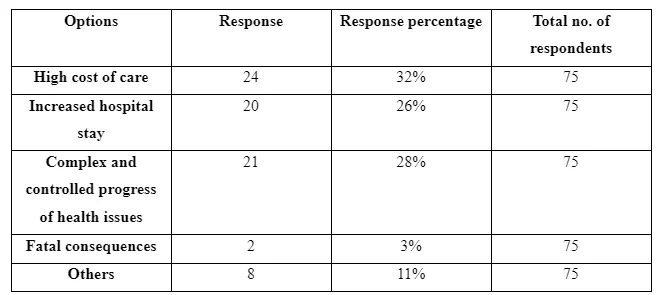
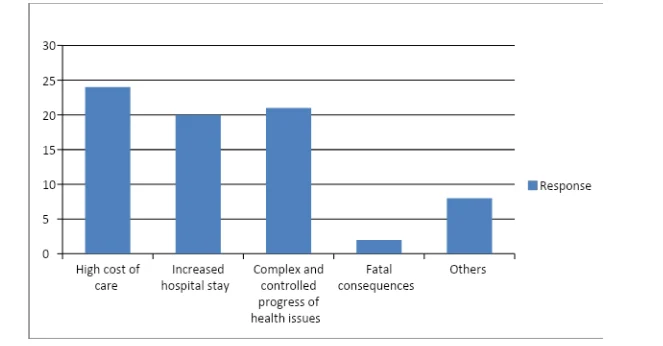
2. What hindrances are faced as a result of medication error during care delivery by the healthcare workers?
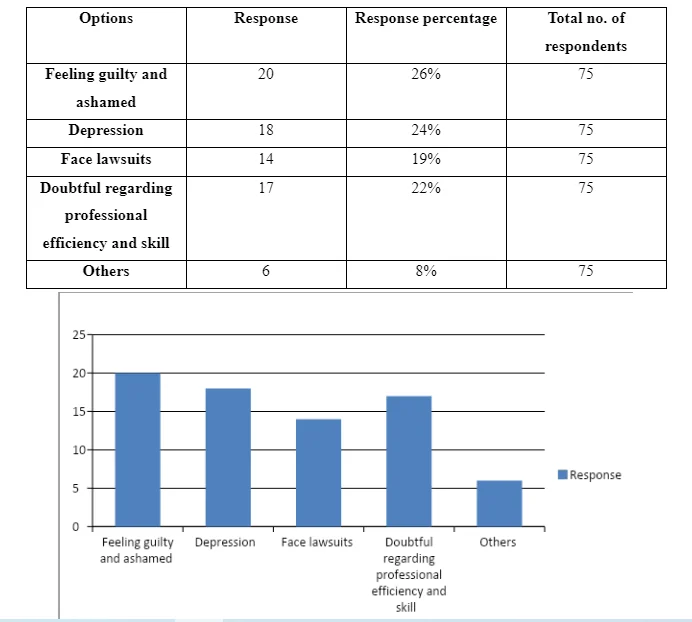
3. What challenges are faced by hospitals where medication error occurs during caring of the patients?
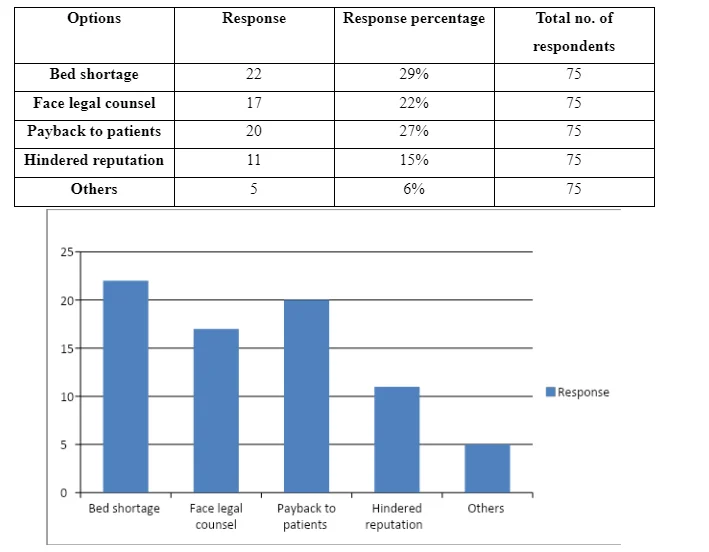
4. How do you think the issue and impact of medication error can be controlled?
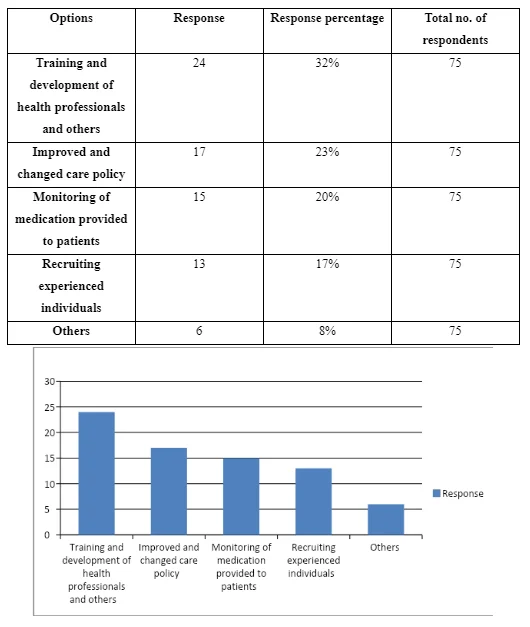
Evaluation
The findings reveal that 28% mentioned disastrous health consequences whereas 32% revealed increased healthcare cost to be the impact of medication error for patients. Moreover, 26% reported prolonged stay at the hospital and 3% mentioned fatal consequences to be faced. This indicates that medication error does cause deteriorated health impact on the patients and coping the impact prolonged hospital stay has to be made. Moreover, to overcome the adversities of the error effective care actions and remedy medications are to be used that leads to raise the overall cost of care for the patient. The impact of medication error in healthcare workers indicates that 24% feel depressed and 26% feel guilt and ashamed of their error. This is evident as medication error by the healthcare workers are mostly done unintentionally and its effect of deteriorated impact on patient’s health causes negative thinking and perception regarding self among the professionals. The survey reveals that in 29% cases the hospital due to medication error face shortage of bed and 225 cases experience legal suits. This indicates that medication error causes disruption in the healthcare system within the hospitals which causes hindrance of care to be delivered to patients.

Conclusion
The above discussion mentions that as a result of medication error patients face increased healthcare cost, prolonged hospital stay, deteriorated health and others. The nurses and healthcare workers as the effect of medication error face depression, feel ashamed and guilty and others. The hospital’s reputation is lowered along with lawsuits are faced by them as a result of medication error during care.
Recommendations
The suggestion for the future to manage medication error is that effective training and development of health workers are to be made regarding the way to provide seamless care delivery with effective identification of medication and its dosage. Moreover, experienced health professionals in the hospitals are to be included to avoid medication error as through their experience they can understand the actions to be taken to avoid the error.
References
Corry, M., Porter, S. and McKenna, H., 2019. The redundancy of positivism as a paradigm for nursing research. Nursing Philosophy, 20(1), p.e12230.
Fathi, A., Hajizadeh, M., Moradi, K., Zandian, H., Dezhkameh, M., Kazemzadeh, S. and Rezaei, S., 2017. Medication errors among nurses in teaching hospitals in the west of Iran: what we need to know about prevalence, types, and barriers to reporting. Epidemiology and health, 39.pp.34-56.
Ha, D., Lee, S.E., Song, I., Lim, S.J. and Shin, J.Y., 2020. Comparison of signal detection of tumour necrosis factor-α inhibitors using the Korea Adverse Events Reporting System Database, 2005–2016. Clinical Rheumatology, 39(2), pp.347-355.
Marei, H.F., Donkers, J., Al-Eraky, M.M. and van Merrienboer, J.J., 2017. The effectiveness of sequencing virtual patients with lectures in a deductive or inductive learning approach. Medical teacher, 39(12), pp.1268-1274.
Salmasi, S., Wimmer, B.C., Khan, T.M., Patel, R.P. and Ming, L.C., 2018. Quantitative exploration of medication errors among older people: a systematic review. Drugs & Therapy Perspectives, 34(3), pp.129-137.
Shehata, Z.H.A., Sabri, N.A. and Elmelegy, A.A., 2016. Descriptive analysis of medication errors reported to the Egyptian national online reporting system during six months. Journal of the American Medical Informatics Association, 23(2), pp.366-374.
Tong, E.Y., Roman, C.P., Mitra, B., Yip, G.S., Gibbs, H., Newnham, H.H., Smit, D.V., Galbraith, K. and Dooley, M.J., 2017. Reducing medication errors in hospital discharge summaries: a randomised controlled trial. Medical Journal of Australia, 206(1), pp.36-39.
Vial, T., Patat, A.M., Boels, D., Castellan, D., Villa, A., Théophile, H., Torrents, R. and Kassai, B., 2019. Adverse consequences of low-dose methotrexate medication errors: data from French poison control and pharmacovigilance centers. Joint Bone Spine, 86(3), pp.351-355.
Walsh, E.K., Hansen, C.R., Sahm, L.J., Kearney, P.M., Doherty, E. and Bradley, C.P., 2017. Economic impact of medication error: a systematic review. Pharmacoepidemiology and drug safety, 26(5), pp.481-497.
- 24/7 Customer Support
- 100% Customer Satisfaction
- No Privacy Violation
- Quick Services
- Subject Experts



